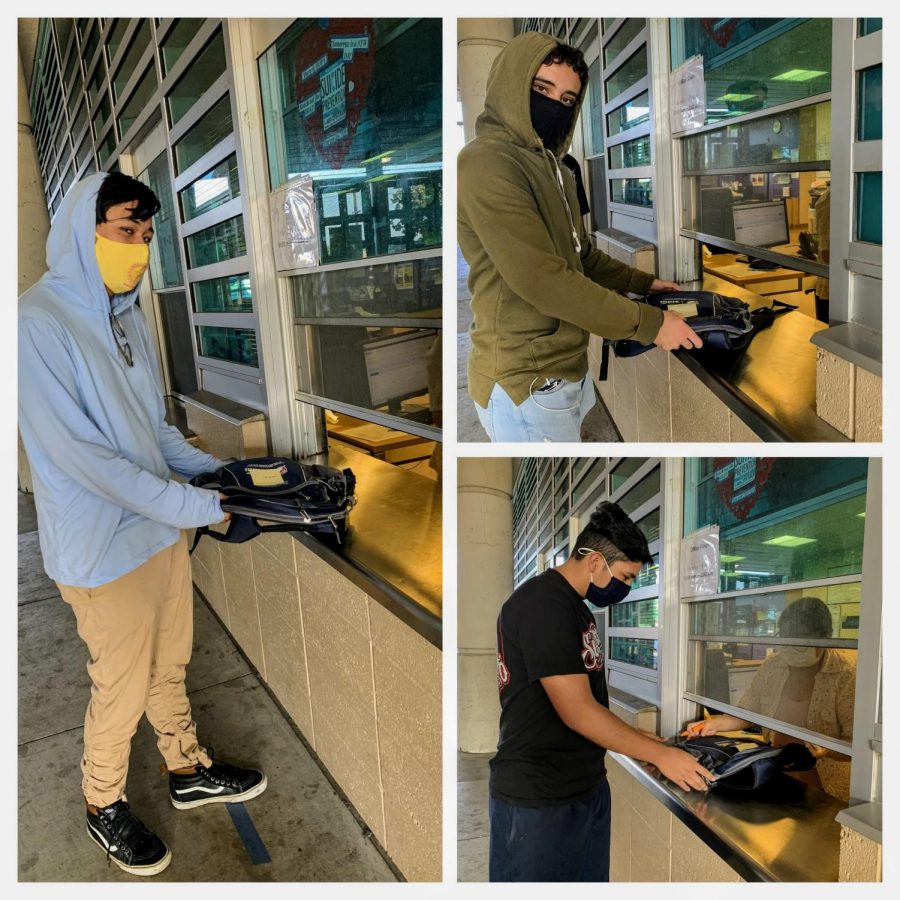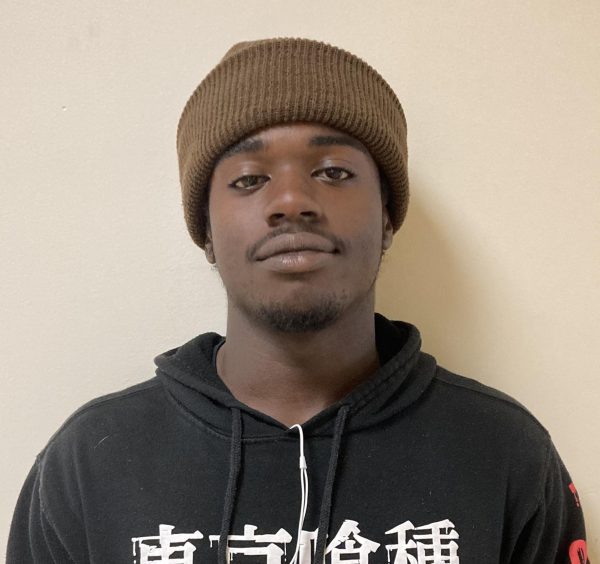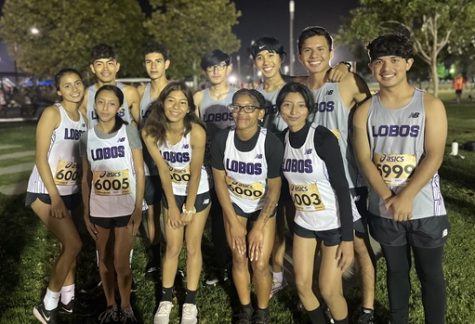LA Galaxy Visits Rancho Dominguez
Christopher Martires and Jacob Chavez
Seniors Gabriel Heater, Christopher Martires, and Jacob Chavez pick up their LA Galaxy Package
November 6, 2020
Professional soccer club LA Galaxy gave juniors and seniors the opportunity for a virtual job shadow that gave insight on the behind-the-scenes aspect of the sports industry. Participants were able to learn about all the strings being pulled to appeal to soccer fans and establishing the connection to soccer and Los Angeles.
Junior Jana Madamba and Senior Lucia Duarte were among those that took part in the job shadow and they talked about why they chose to join it.
“Apart from not having to attend a few classes, I wanted to be a part of the job shadow because I love sports and although soccer is not at the top of my list, I thought it would be a great opportunity to learn about what goes on behind the scenes because it’s not something we see often,” Madamba notes. “Also I’m open to learning about different careers because I’m still unsure about my future.”
“The reason why I joined is just because I found it interesting because it’s like something that is literally right next to my house, to put it in those words,” Duarte affirms. “It’s not like I’m not a curious person that wouldn’t be interested in something that is literally around my corner. It allows me to have more of a close-up of what actually goes on rather than just watching a soccer game.”
Whether it was done virtually or in person, the students definitely were able to get the most out of their experience. Duarte, Madamba, and the other attendees were able to learn about all the communicating, designing, and editing done to make LA Galaxy’s athletes stand out from the numerous soccer clubs around. As well, the job shadow highlighted the existence of careers like video production and social media marketing in the sports industry.
Not only was it a great learning opportunity, but Students like Madamba and Duarte were also able to come to new conclusions in their journey to their career paths.
“I’ve always had my eyes set on the medical field but I never really knew what I truly wanted to specialize in,” Madamba acknowledged. “At first I was thinking about working in pediatrics or working as an OB-GYN (obstetrician-gynecologist), but after learning about the LA Galaxy and the community and relationships people had with one another made me want to be a part of the sports industry. So I may have my eyes set on kinesiology (the study of the mechanics of body movements) or rheumatology (the study of disorders of the joints, muscles, and ligaments). I think it would be great to work with athletes! I definitely feel that LA Galaxy has helped me take a step closer to figuring out what I want to do in the near future.”
“What stuck with me the most is the fact that some of them were Latino, you know,” Duarte said. “Soccer is a worldwide game, but it kind of feels like Hispanic people can feel closer to it. I mean in such a world where you see the white male as a superior [figure], it’s kind of [great] to see that fellow Hispanics like I am are working a job that I can easily take over–well not takeover but [it’s something I can also do].
The job shadow paved the way for students to not only see the unsung heroes of the sports industry but as well as reconsidering their path in life and bring a new perspective to the industry. Speakers Barbara Maningat and Kelsey Lewis showed that you can work and lead departments at a prestigious place as a woman while Adam Serrano and Terrell Wong showed your career aspirations are not set in stone and can be changed.
Not only was the career insight invaluable, so was the amount of detail given about the things the speakers do daily and all the thought that goes into managing LA Galaxy. For example, senior manager of video production Barbara Maningat sheds light on how they pick which emotions to use in their promotional videos to appeal to a wide audience when feelings are subjective and not everyone might feel the same way as others.
“Man. What we do is so subjective most of the time.” she clarified. “To your point, people can watch a video/read an article/observe a piece of art and it resonates differently than another person who consumes the same content. For me, it boils down to answering, “why should people care?” So, let me break that down.
“We do these videos called, “Match in a Minute,” where we recap games in 60 seconds,” she said. “These can get pretty mundane if we do it after every game, so how can we make these more interesting for viewers? Find an aspect to focus on – did a second-half substitution change the game and cause the shift to win the game? If the team came from behind to win the game, can we dramatize the struggle, the missed shots, the fouls, etc. to showcase the contrast to the relief/elation when we finally scored? Did a young player make his MLS (Major League Soccer) debut and change the energy of the game? If we can pinpoint a particular storyline, we can help guide our various audiences to feel the same emotion. In identifying which emotion you want to emanate, a lot of the time it’s (for lack of better terms) FOMO (Fear Of Missing Out) and empathy. When a player is super honest and open in a feature interview, I want fans to feel the same emotions that the player is feeling. I want their hearts to ache if he shares his story about overcoming cancer and still going pro, etc. If a player is being goofy and trying ridiculous trick shots at training, I want viewers to feel like they could be friends with him, laugh with him, feel like they could be standing right next to them in their antics. If we win 3-0 at home, I want viewers to feel FOMO by feeling the energy of the stadium, and wish they had been there, like it’s a night they’ll remember forever.”
Maningat establishes the amount of thought that goes into every promo video and what message she and her team are trying to convey through them. She wants the audience to understand that her videos should be an example that these soccer players are just like us and have the same humble beginnings.
Senior editor of communications Adam Serrano helped give tips on how to cover things sports-related during the pandemic and how to keep people engaged when sports are dry at the moment.
“I think what we’ve done and what we continue to do is we found a lot of different ways to cover the team and different stories to tell,” Serrano notes. “I mentioned focusing on stories that were fan-related–or spirit-related for schools–but one thing I worked on a lot with the team is that we created some great lists about past players. We have the Kona Build Your Team where we’re trying to have fans pick our past best eleven from a series from Galaxy Greats. Based on the history of your school, that could be an interesting story to tell in terms of past teams, past jersey colors. They’re so many different ways you can look at your history and break it down into content; that’s kind of what we were forced to do. We started the pandemic doing these things called MLS Cup Mondays where we just look at a past game and we have people break them down. I think looking at an oral history of any big moments could be good. The thing I learned that helped me transition from being a reporter to working in content and social media that there is so much beyond the game. As a reporter you often get so focused on the game, that’s like your bread and butter, that is everything you focus on is what happens for 90 minutes or four quarters and you don’t really see everything beyond that. But there’s a whole culture beyond that. Whether it’s at your school, whether it’s at the Galaxy, whether it’s at the Dodgers, there’s a whole culture that exists that keeps all of that stuff going. I think focusing on those stories are key.”
Serrano understands that the pandemic has made things hard for sports to be reported on, but it won’t stop LA Galaxy from churning out quality content. He also points out the repetitiveness of reporting on the same games over and over again, but finding the motivations behind the players or the workers at Stadiums can help elevate the creativity in sports-related journalism. As he says, it’s about telling those stories beyond just the game.
LA Galaxy provided Rancho students the everlasting opportunity to job shadow at the club and it surely gave them a brand new lens to look at the world of sports. The amount of effort that is done behind the scenes and the personal stories of the speakers are things that the students will keep in mind from now as well as the central idea that you do not have to be an athlete to have a career in sports.




Michelle Fermin • Nov 14, 2020 at 10:22 pm
This article was well written. I love the amount of interviews, it made me feel as if I was apart of the experience!